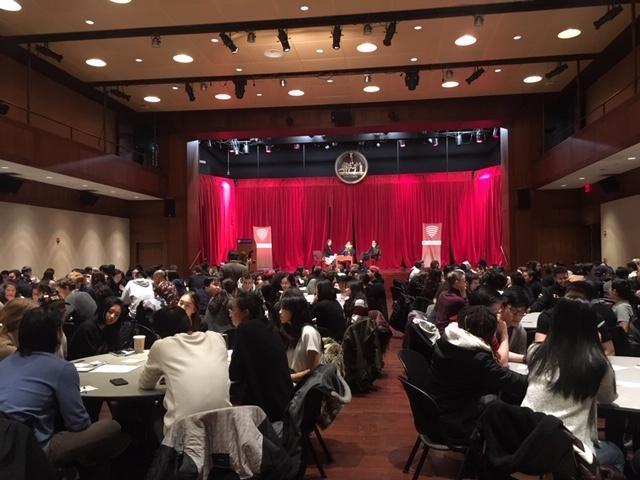Two professors discussed the relationship between religion and science in a talk called “Can Science Explain Everything?” on Thursday night.
NYU Professor of Psychology Pascal Wallisch argued for a more traditional view of science, one with little reliance on faith. Oxford University Professor of Theoretical Physics Ard Louis sees Christianity as playing an important role in one’s worldview.
More than 100 people gathered around tables in the Eisner and Lubin Auditorium at the talk hosted by the Veritas Forum — a non-profit organization that hosts forums on science and religion across college campuses.
“Tonight’s event is not a debate,” moderator Kelly Seaton said. “It is a real discussion about connecting truth with people of all backgrounds and beliefs.”
Louis, who is a physicist of Christian faith, believes that science has deep, historical roots in Christianity. He argues that there is no physical manifestation of God. Instead, the reason why the universe exists, in his view, is God.
The differing beliefs of the two professors were exemplified when Louis told the story of how he found his wife. He said that he cannot capture marriage scientifically, and the relationship depended on a leap of faith. Wallisch interjected by saying that he is compatible with his wife because she had the highest correlation with his responses to a survey about movies.
Wallisch started off by defining science as using our observations to make predictions about the world. He brought up the Black Swan Problem, which is a theory that describes how large events which have a disproportionate impact on things are often rationalized and lead to a change in perspectives, despite being outliers.
Wallisch addressed the differences between science and religion by stating that science is always being updated, while religion remains unchanged.
Wallisch and Louis then came together with moderator Seaton to discuss the limits of science and the role of faith in scientific pursuit.
CAS junior Bee Kaur said that the event helped her better understand the relationship between religion and science.
“This was a very insightful event discussing how science and faith can coexist,” Kaur said. “It’s not a matter of conflict but rather how both can be good, [and] can advance our understanding of the world around us.”
Email Cecilia Hua at [email protected].

























































































































































